
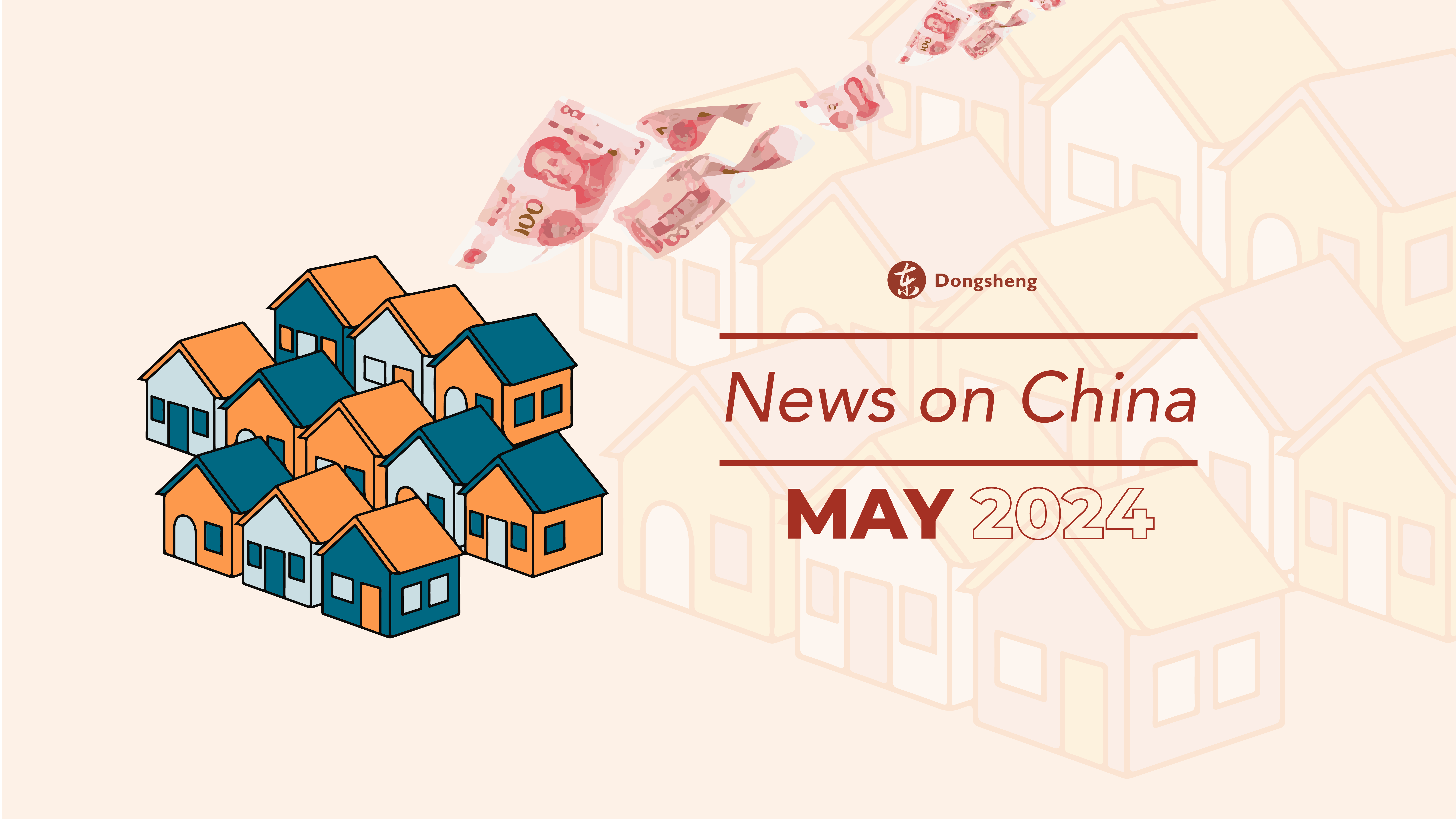
On his recent visit to Serbia, Xi Jinping said, “The Yugoslav movie The Bridge and the song Bella Ciao, which evoke strong patriotic and anti-fascist sentiments, have been immensely popular in China over the years and have become my companions in my younger days”. So today, we recommend listening to the Chinese version of Bella Ciao.
If you don’t have a lot of time, this is what you should know:
- Beijing announced US$41.5 billion in financing to help reduce excess housing inventory
- China’s international trade increased by 4.4% in April
- Tourism rebound with nearly 300 million trips during May holiday
- New cross-sanctions between China and the United States
- Putin’s visit to China and Xi’s visit to Europe
Vladimir Putin in China: shared positions and more cooperation between Eastern powers
Vladimir Putin chose China as his first foreign trip after starting his new term as President of Russia. In the 43rd meeting between the leaders, Xi and Putin declared a “new era” partnership between China and Russia. In a joint statement, they expressed opposition to the US policy of destabilization and a shared view on a multiplicity of issues, from Taiwan and Ukraine to North Korea, as well as cooperation in new technologies and peaceful nuclear finance.
Undoubtedly, the U.S.-led Western sanctions have elevated China-Russia relations to an all-time high. This is reflected in growing cooperation and record highs in bilateral trade.
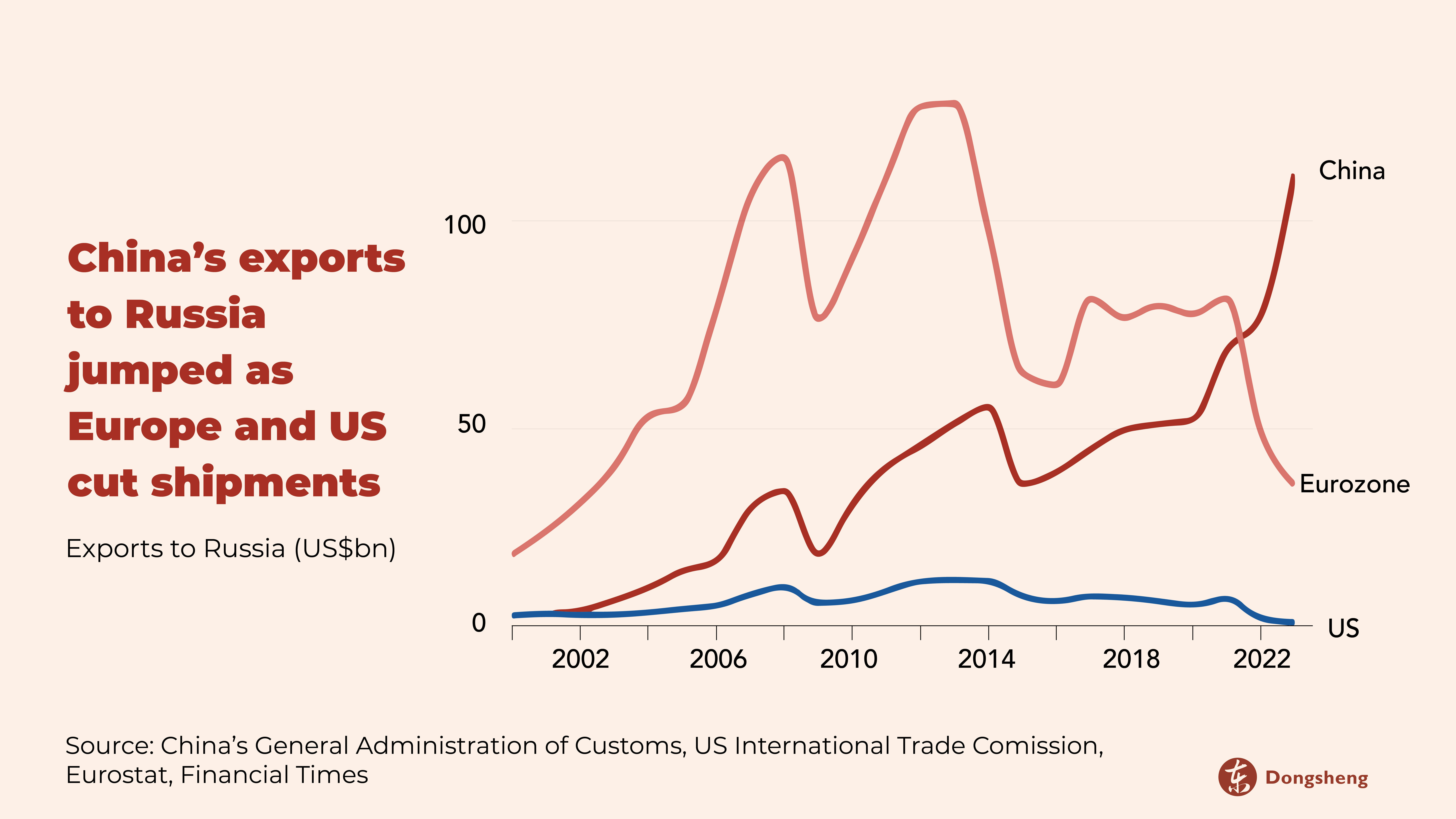
In 2023, Russia’s trade with China reached a record $240.1 billion, up 26% from the previous year, and more than 60% from pre-war levels. China accounted for 30% of Russia’s exports and almost 40% of its imports. In addition, Russia overtook Saudi Arabia as China’s largest oil supplier.
Before the war, Russia’s trade with the European Union was twice that with China; now, it is less than half. The Chinese yuan is now the primary currency used for trade between the two countries, making it the most traded currency on the Moscow stock exchange and savings instrument. Settlement in local currencies of trade between China and Russia grew from 45% in 2022 to 95% now.
Over half of the one million cars sold in Russia last year were made in China. The top six foreign car brands in Russia are now all Chinese, similar to what is happening with smartphones, with Xiaomi and Tecno overtaking Apple and Samsung.
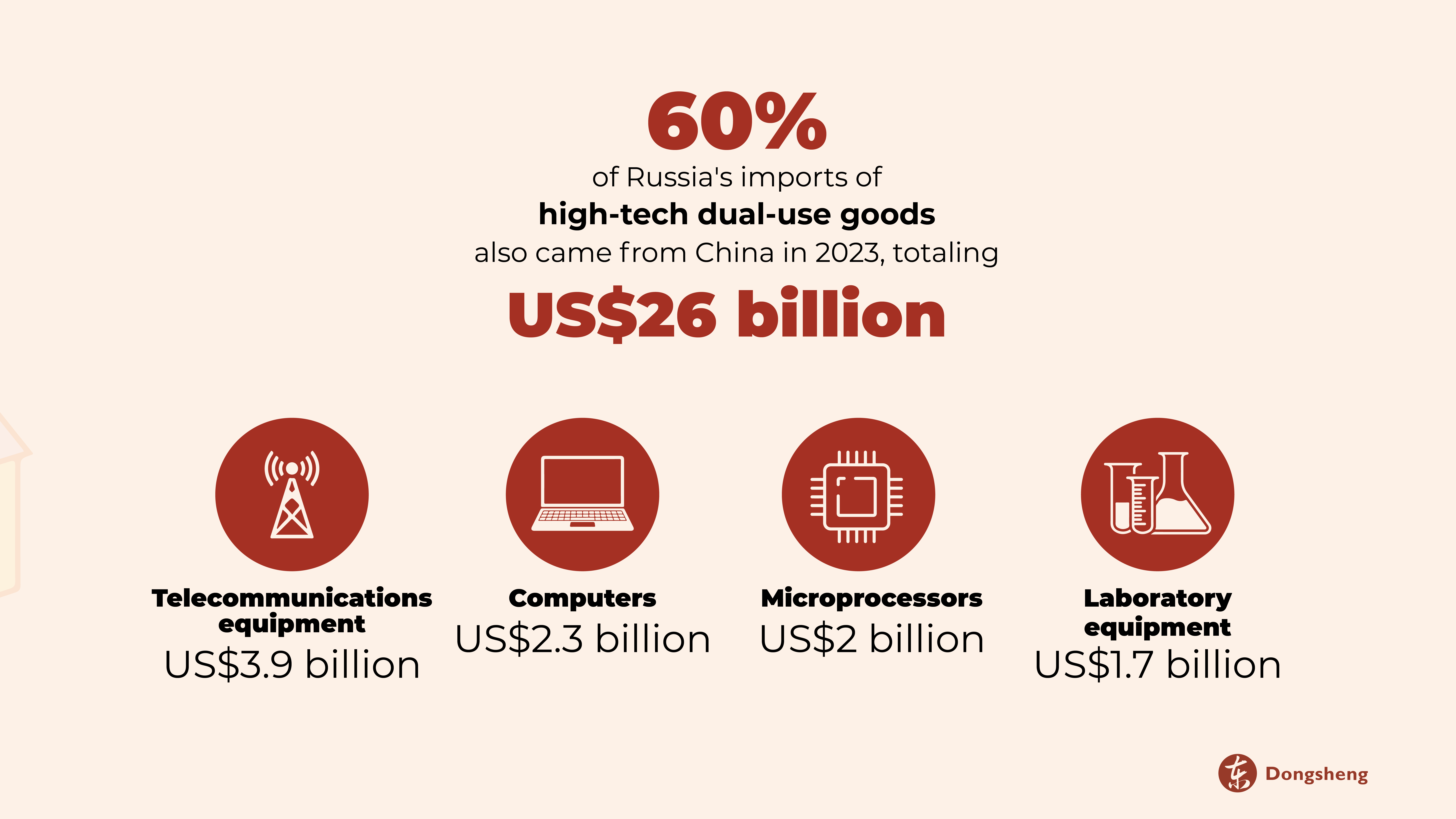
Almost all of the imported technology used in Russian weaponry is of Western origin, with only 4% produced by Chinese companies, contradicting Western accusations that China directly supports Russian war efforts.
China and Russia are increasing their presence and cooperation with Africa
The partnership between China and Russia, arising from the rejection of unilateral sanctions and how the West has organized international relations, is attractive to many countries in the Global South seeking greater independence and bilateral partnerships that are more respectful of their sovereignty.
This is why, in regions such as Africa, both China and Russia are increasingly seen as powers with a positive influence. Recent US Gallup research shows that U.S. approval fell from 59% in 2022 to 56% in 2023, while China’s rose from 52% to 58%, and Russia’s rose from 34 to 42%.
The United States’ meddling policy has dramatically affected its image. Whenever the government in power in a country does not respond to US interests, it decreases its support and bilateral projects with the excuse of condemning coups d’état. On the other hand, China has a policy of non-interference in government internal affairs, proposing long-term agreements and projects.
In particular, in the Sahel region, where a series of revolutions opposing French colonialism have taken place, Russia’s military support and China’s economic support are welcome in Niger, Burkina Faso, and Mali.
On the other hand, African countries as a whole condemn the State of Israel for the genocide of the Palestinian people, a view they share with Russia and China, while the United States not only unconditionally supports Israel but also continues to send it arms and military aid.
Xi travels to France, Serbia, and Hungary
The Chinese leader visited three European countries with which China has special relations. Xi Jinping began his trip to France, where his two-day visit and talks with President Emmanuel Macron focused on the war in Ukraine and trade imbalances with the EU. Macron sought to demonstrate European unity by including European Commission President Ursula von der Leyen in the meetings, who again accused China of allegedly using “market-distorting practices” by subsidizing industries such as steel and electric vehicles. China and France signed 18 cooperation agreements covering aviation, agriculture, people-to-people exchanges, green development, and SME cooperation.
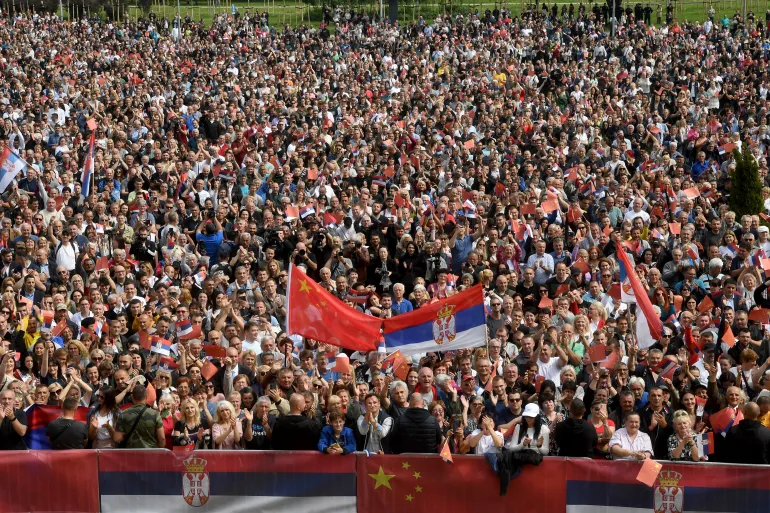
[Dimitrije Goll]
In Serbia, more than 15,000 people gathered with Serbian and Chinese flags in the square in front of the Government Palace ahead of Xi’s arrival, who met with President Aleksandar Vučić. Xi arrived in Belgrade on the day of the 25th anniversary of the US shelling. “We will never forget the shelling of the Chinese Embassy in Belgrade”, he said.
Finally, in Hungary, Xi met with President Viktor Orbán, who stated that “China is one of the pillars of our new multipolar world” and that “it is the country that now shapes global economic and political processes”. Today, Chinese investments constitute 75% of all foreign investments in the country, valued at more than US$ 22 billion.
New cross-sanctions between China and the United States
A new proposal from the Biden administration will seek to increase tariffs on Chinese industry gradually between 2024 and 2026. The electric car sector will be the most affected, as the proposal will seek to increase tariffs from 27.5% to 100%. Other products affected would be solar cells, semiconductors, batteries, and aluminium products, with tariffs ranging from 25 to 50%. The US will not apply the proposed 2026 tariffs on natural graphite and permanent magnets. According to Chinese specialists, rather than directly affecting China, these new sanctions seek to generate a domino effect so that other Western countries also increase their restrictions on trade with China.
For its part, China’s Ministry of Commerce recently announced that it will sanction some U.S. companies linked to arms sales to Taiwan. General Atomics Aeronautical Systems, General Dynamics Land Systems, and Boeing Defense, Space & Security were placed on a list of untrustworthy companies. Their executives will not be allowed to enter China, their work permits will be revoked along with their visitor and residency status, and any applications they submit from now on will not be approved.
In addition, the ministry will also launch an anti-dumping investigation on plastics imported from the United States, the European Union, Japan, and Taiwan.
More than 50 cities relax home-buying policies, Beijing earmarks US$ 42.5 billion for financing
In a historic move, Beijing announced 300 billion yuan (US$41.5 billion) in financing to help reduce excess housing inventory, and measures to ensure that real estate developers have access to financing and to encourage the buyback of “idle” land.
These funds will allow local state-owned companies to purchase unsold homes and offer them as affordable housing for the people. The monies will be provided to 21 national lenders at a rate of 1.75%. The funds are used to buy homes that have already been built but not sold, and local governments can decide whether to join the program according to their needs.
China is redoubling its efforts to boost the domestic real estate industry. More than 50 cities relaxed their home-buying policies, and only six provinces and municipalities in the country have not completely lifted previously imposed restrictions.
Purchase limits were introduced in the past when housing prices rose too fast, but now speculative demand is much lower.
Among the measures implemented, purchase restrictions have been eased, and the sale of urban residential housing is encouraged to promote home purchases and the healthy development of the real estate market.
Potential buyers in Hangzhou and Xi’an, for example, no longer need to meet conditions such as having a local hukou (residence permit) or a local social security account, and there is no longer a limit on the number of apartments each person can buy.
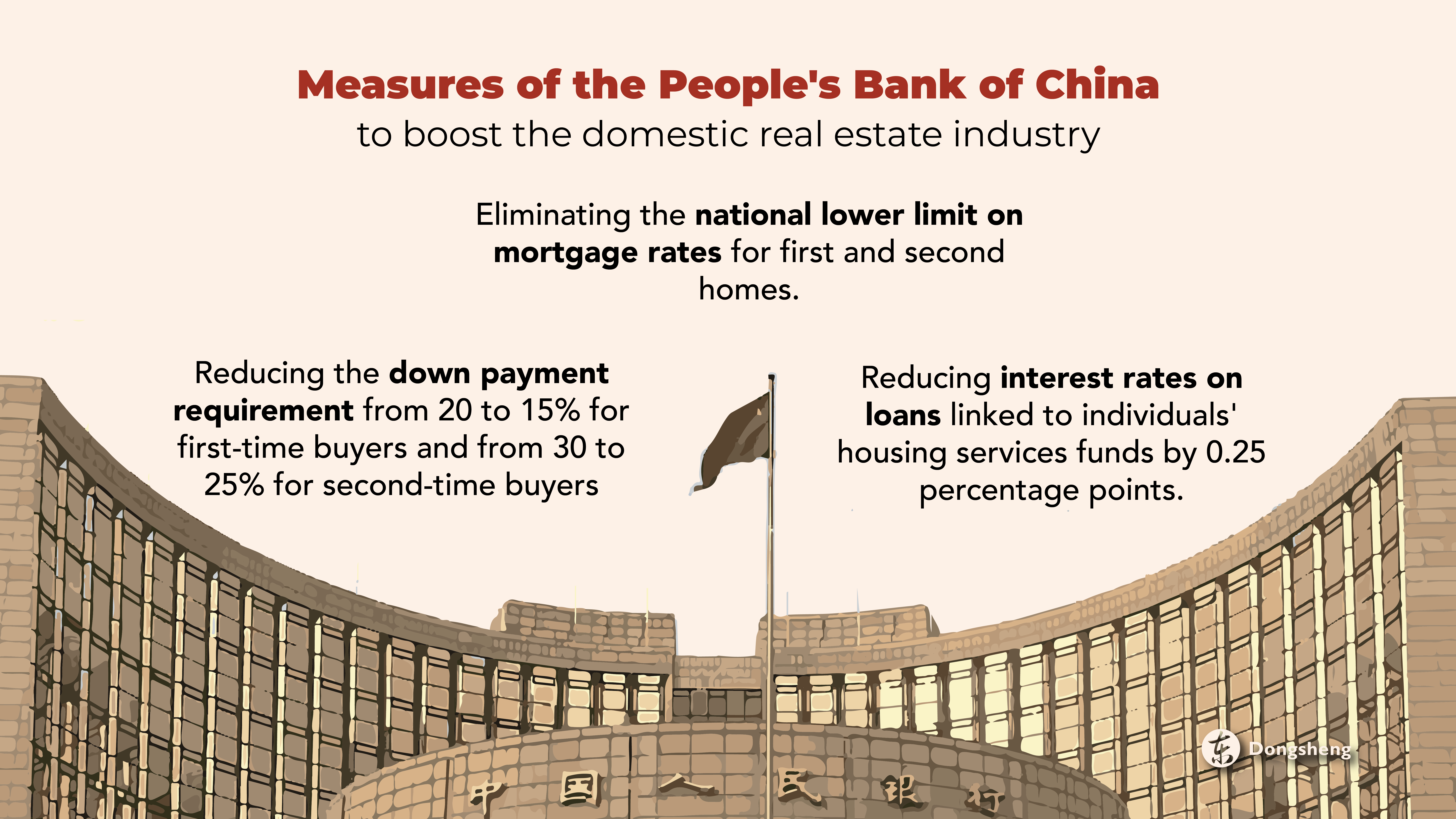
Recent official data showed that the real estate industry is still in a downward spiral. New home prices in first-tier cities fell 0.6% in April, the eleventh consecutive month of decline. Real estate investment fell 9.8% year-over-year in the first four months of 2024.
William Lai, the new leader of the island of Taiwan, begins his term in office with a hostile speech toward the mainland
Lai belongs to the separatist Democratic Progressive Party, which is aligned with the United States. In his inauguration speech, he pledged to maintain the cross-strait “status quo”, defend “Taiwan’s sovereignty”, and urged the mainland to stop its “bullying” of the island. In addition, he described Taiwan as a “frontline guardian of world peace” because of its strategic location in the “first island chain,” a strategy the United States was able to use during the Cold War to contain the Soviet Union and China with a military presence in the Western Pacific.
The speech was not well received in Beijing. The Taiwan Affairs Office said Lai had shown his true nature as a “Taiwan independence worker,” inciting cross-strait confrontation and attempting to “rely on outside forces to seek independence.”
The United States sent an unofficial delegation to the inauguration. While it does not officially recognize the island, it is its main political and military ally and has repeatedly used the Taiwan issue to provoke China. As recently as early May, a U.S. Navy destroyer sailed through the Strait, which was criticized by China. In recent arms packages, in addition to Ukraine and Israel, the U.S. has included Taiwan, demonstrating its strategy of stoking regional conflicts in sensitive areas around the world.
Before the inauguration, mainland China’s Foreign Affairs Office targeted five Taiwanese personalities for spreading false and negative news about the mainland and provoking tensions across the Strait. Three of them are politicians, one is a presenter, and one is a TV commentator.
China’s international trade increased by 4.4% in April, and ASEAN remains its largest trading partner
Both Chinese exports and imports grew in April, partly thanks to last year’s low base, the recovery of external demand, and the effectiveness of foreign trade policies. Most exports were machinery and electrical products, especially automobiles.
Despite increased scrutiny of its trade by the United States and Europe, the total value of exports increased by 1.5%, reversing the sharp 7.5% decline recorded in March.
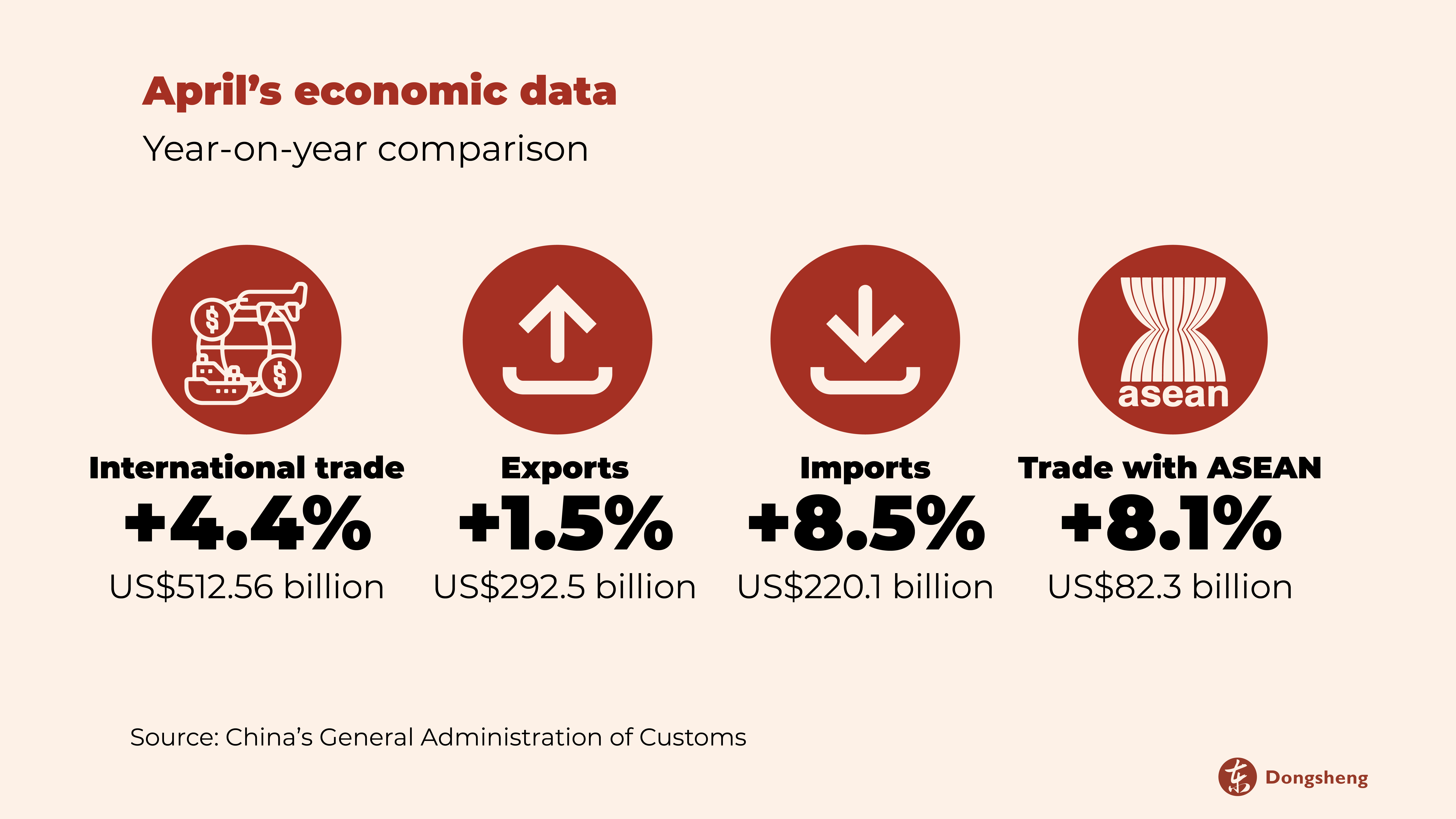
Foreign direct investment fell again in the first quarter of the year. According to official sources, the year-on-year drop was 56%, US$ 10.3 billion, or 26%, US$ 41.7 billion. The difference in the figures is due to differences in FDI estimation methodologies. The Chinese government is seeking to boost foreign direct investment through a series of measures, including expanding market access and relaxing some restrictions.
Mastercard started to process payments in yuans
Mastercard entered China’s yuan-denominated bank card clearing sector. Mastercard NetsUnion Information Technology (Beijing) Co. Ltd., its China joint venture, began processing domestic payments in May. It is the second international company to do so, following American Express, which received its clearing license in 2020, also through a joint venture with a Chinese company.
According to central bank data, China’s bank card transactions totaled 1.09 trillion yuan (US$154.7 billion) in 2023. For years, China’s state-owned UnionPay has dominated this huge market.
New regulations to prevent fraud in nursing homes
China tightens rules on facilities that care for the elderly, prohibiting down payments of more than 12 times the monthly cost. Elderly care facilities often adopt an upfront payment model to help fund construction and operational pressures. However, multiple fund management problems and illegal cases of collection and fraud have emerged.
Among other known cases, last year, owners of senior apartments in Hunan province escaped with nearly 100 million yuan (US$14 million) in deposits collected from 1,800 seniors.
The new guidelines also define the service fees, deposits, and membership fees that providers can charge and clarify requirements on the collection duration.
China’s Ministry of Education launches campaign to solve a series of problems in schools
China’s Ministry of Education announced the start of a campaign focusing on 12 issues including bullying, teachers who discriminate against students or use corporal punishment in the classroom, and schools that give excessive homework or do not allow students to have recess. The campaign will run through the end of the year and affects China’s preschool, primary, and secondary education systems. The ministry plans to introduce a new public grading and supervision system for teachers, schools, and local authorities and will provide teachers with additional training.
A series of high-profile incidents have raised public concern. In March, three teenagers in Hebei province were found to have killed a 13-year-old boy living in the same city. The case sparked outrage in China and intensified discussion about the country’s rising juvenile crime rate. In 2021, the Chinese government lowered the age of criminal responsibility from 14 to 12 for serious crimes.
May Day holiday: tourism rebound with nearly 300 million trips
During the five-day holiday, China recorded 295 million trips nationwide, up 7.6% year-on-year and 28.2% higher than pre-COVID pandemic levels in 2019.
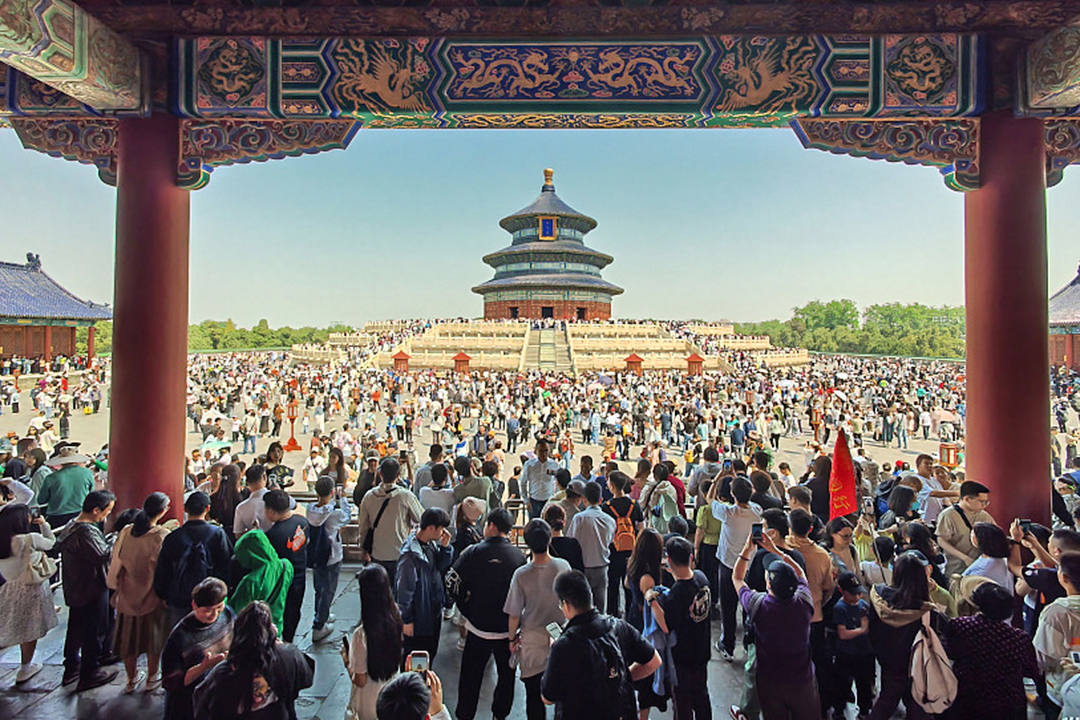
Temple of Heaven’s Hall of Prayer for Good Harvests in Beijing [VCG]
Tourism revenue totaled 166.89 billion yuan (US$23.1 billion), up 12.7% year-on-year. However, tourists spent an average of 565 yuan (US$78) this year, still below the 603 yuan average reported in 2019.
China’s vacation box office revenue reached 1.53 billion yuan, similar to last year and 2019. In addition, China received about 779,000 foreign tourists, up 98.7% from the same period the previous year.
The May 4th Movement on the screen
In addition to International Workers’ Day, China also commemorates its National Youth Day on May 4 during the extended holiday. In 1919, students and other patriotic youth sparked a protest that opposed colonialism and foreign interference and laid the groundwork for the founding of the Communist Party of China two years later. Today, those young people are remembered as the May Fourth Movement, and their story has been portrayed many times through various artistic expressions. We recommend three films and a television series on the subject.
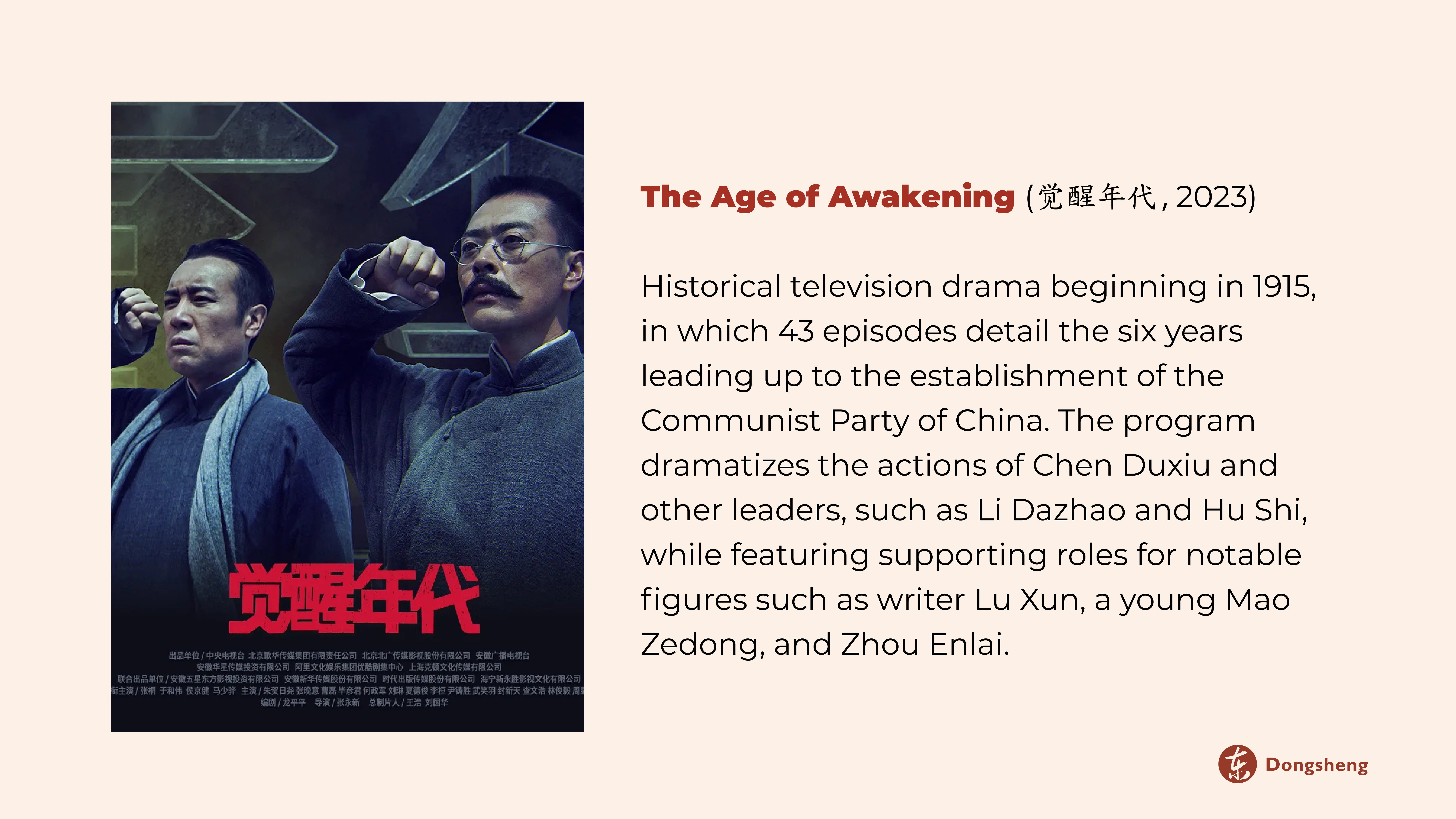


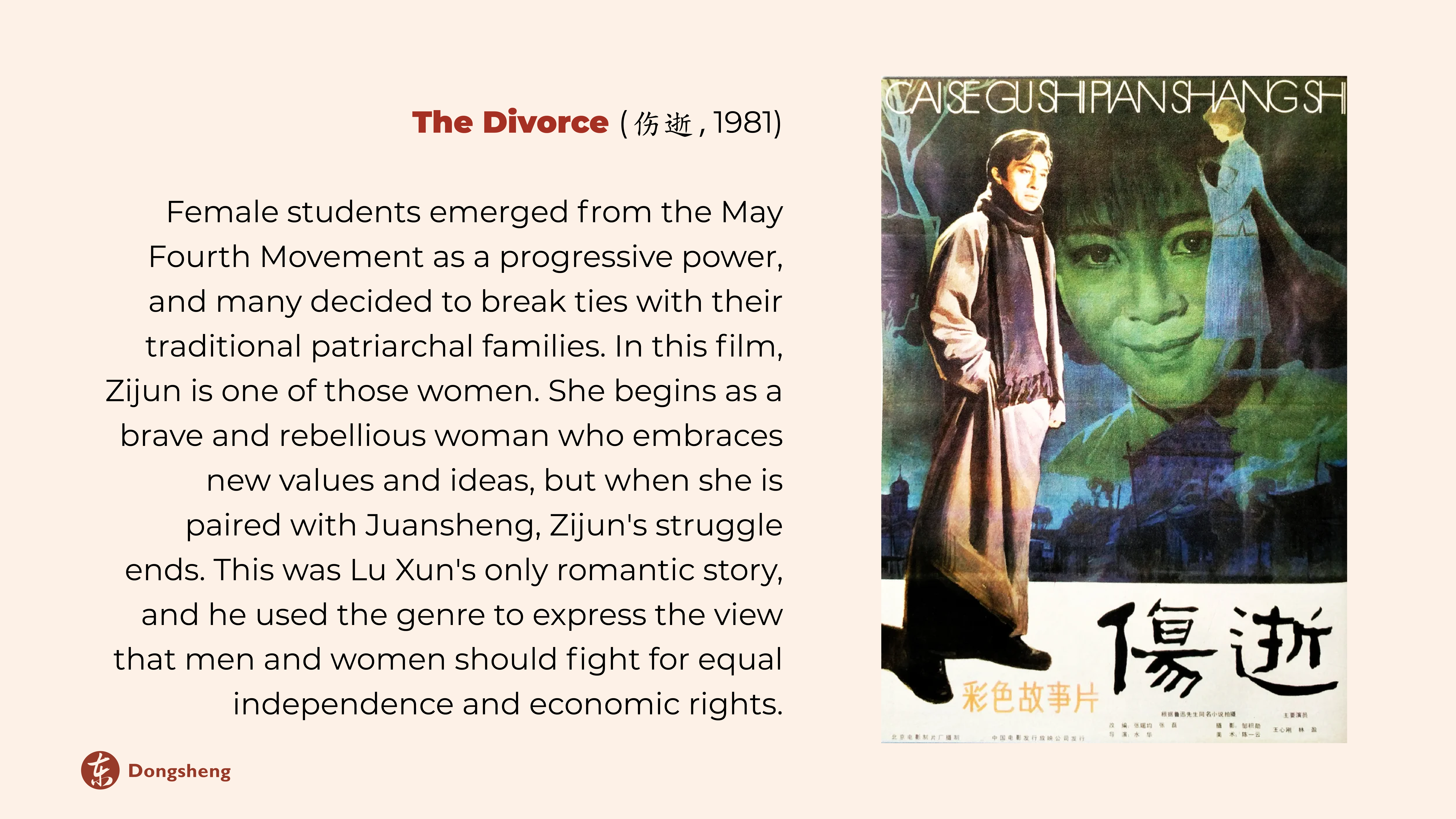
Subscribe to News on China. The digest is published every Saturday in English, Spanish, and Portuguese.
Follow our social media channels:
- Twitter: @DongshengNews
- Telegram: News on China
- Instagram: @DongshengNews
- YouTube: Dongsheng News
- Facebook: Dongsheng News
- TikTok: @dongshengnews





